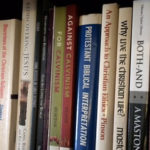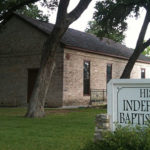Posted: 5/30/03
Heritage: Baptists need new ethics 'scouts,'
Tillman tells gathering of historians
By Ken Camp
Texas Baptist Communications
BELTON–Trails blazed by Baptist pioneers in ethics have grown over from neglect, and new scouts are needed to “beat out the pathways” for this generation, an ethicist told the Baptist History & Heritage Society.
Bill Tillman, professor of Christian ethics at Hardin-Simmons University's Logsdon School of Theology in Abilene, participated in a panel discussion on “Frontiers in Baptist Ethics” at the society's annual meeting, May 22-24 at the University of Mary Hardin-Baylor.
| See Related Stories: • Heritage: Baptists need new ethics 'scouts,' Tillman tells gathering of historians • Heritage: Baptist women can thank pioneer pair for opening doors |
Tillman described two 20th century Christian ethics professors–Henlee Barnette of Southern Baptist Theological Seminary in Louisville, Ky., and T.B. Maston of Southwestern Baptist Theological Seminary in Fort Worth–as “scouts” and “pioneers” in Christian ethics who helped Baptists engage the culture.
| Henlee Barnette and T.B. Maston “had ways of getting into your convictional DNA. They operated as encouragers, inspirers, investors in the future. They stirred in others the passion they felt.”
–Bill Tillman |
“We need them, or their kind, more than ever because, as a friend has insightfully observed, the pathways grow over. The frontiers reappear with each succeeding generation,” he said.
Christian ethics is “on the wane” in Southern Baptist Convention-supported seminaries, Tillman reported. At the same time, he noted, few of the “moderate” seminaries and divinity schools created in recent years have made Christian ethics an educational priority.
“Both Barnette and Maston have understood that the pathways can grow back over. The basic landscape remains the same. Issues of money, sex and power–which cover the landscape–are ever with us,” he said.
“Another point of identification for Barnette and Maston is that human nature is such that ethical matters have to be revisited. Our sense of ethical direction has to be retuned and resharpened from time to time.”
Tillman identified Maston and Barnette as “identifiers of ethical topography” who were able to “communicate the lay of the land” to people in the pews of Baptist churches. They contextualized and interpreted the ethical insights of globally recognized ethicists Walter Rauschenbusch and Reinhold Niebuhr for Baptists in the South.
Maston and Barnette influenced generations of Baptist leaders not only through their prolific writing for scholarly and popular audiences, but also through their classrooms. Maston taught at Southwestern Seminary from 1922 to 1963, and Barnette taught at Southern Seminary from 1951 to 1977.
“They had ways of getting into your convictional DNA,” Tillman said. “They operated as encouragers, inspirers, investors in the future. They stirred in others the passion they felt.”
David Stricklin, associate professor of history and chairman of humanities at Lyon College in Batesville, Ark., described the contributions of Martin England on what he called “the far frontiers” of Baptist ethics.
“In the annals of Southern Baptist history, few persons covered themselves with more distinction in the areas of racial justice, civil rights and peace activism than Martin England. And few labored in these areas with greater anonymity,” he said.
England and his wife, Mabel, served as Northern Baptist missionaries in pre-World War II Burma. After the Japanese army overran Burma, they returned to Louisville, Ky. There England met Clarence Jordan, a Southern Baptist New Testament scholar and civil rights advocate.
“The two of them realized they shared a dream of creating an intentional community in the southern United States based on modern agricultural economy, a commitment to biblical ethics and a dream of racial reconciliation for the South,” Stricklin said. “They and their wives moved to Sumter County, Ga., bought some land and started Koinonia Farms (an interracial community) in 1942.”
The Englands left Koinonia to return to Burma, but they were forced to return to the United States due to health concerns in 1953, and England went to work for the Northern Baptists' Ministers and Missionaries Benefit Board. Technically, his job was to serve as American Baptist field representative meeting the needs of Northern Baptist ministers and missionaries who retired and were living in the South.
“His covert assignment was to be a minister to persons who got into various kinds of trouble as part of the struggle for civil rights for African-Americans in the South in the 1950s and '60s. He often appeared, seemingly out of nowhere, to visit people in jail, help their families and do whatever he could to help without calling attention to himself,” Stricklin said.
England secured a life insurance policy for Martin Luther King Jr. when he was considered a bad risk, and England carried the policy in his coat pocket for months before one of King's aides convinced the civil rights leader to sign it.
The central theme of England's ethics–learned from the Kachin people of Burma as they left the worship of tribal chieftains to follow Jesus–was “the ongoing requirement of believers to avoid ceding spiritual authority to earthly figures instead of to God,” Stricklin observed.
Estelle Owens, professor of history and chairwoman of social sciences at Wayland Baptist University in Plainview, examined the racial justice commitment of Bill Marshall.
Marshall became president of Wayland in 1947. In May 1951, he led the school to admit African-American students into its classes, dormitories and dining hall. “Wayland thereby became the first four-year liberal arts undergraduate college–public or private–in the former Confederate South to be so integrated,” Owens noted.
“Throughout his life, Bill Marshall fought racism and bigotry. He stood up to be counted when the easiest course would have been to go along with the prevailing mores of his day. A true Christian pioneer in the area of race relations, he was one good man who would never stand idly by and allow evil to triumph.”













We seek to connect God’s story and God’s people around the world. To learn more about God’s story, click here.
Send comments and feedback to Eric Black, our editor. For comments to be published, please specify “letter to the editor.” Maximum length for publication is 300 words.